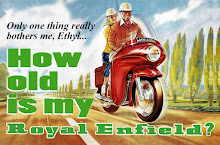The brakes of a Royal Enfield motorcycle work better when they're rusty. It's true, and the proof is in the April/May 2012 edition of The Gun, publication of the Royal Enfield Owners Club.
REOC member Brian Whittaker discovered that the front brake drum of his nine-year-old Bullet had become honed "to a mirror finish." The shoes could not get a grip on it. He took emery cloth to it but despaired when this proceeded slowly.
Over a cup of tea, he writes, "I had a brainwave. I remembered my very first motorcycle, a dishevelled 1932 BSA Empire Star that had seen better days, but could stop on a sixpence because it had been left out in the rain a lot, so the brake drums had a nice coating of rust inside.
"My problem with the Bullet had been caused by too much loving care; I should have let it get, and stay wet more often!"
Adopting what he calls "alternative technology," Brian sprayed water into the drum and let it rust.
"Now my front brake works very well indeed, and maybe in future I will be leaving the Bullet out in the rain more often," he wrote.
I know this is true in my own experience.
At one point I prided myself on keeping the rear brake of my 1999 Bullet adjusted close to the drum, for instant action. Commuting home in the rain one day I noticed the Bullet was slowing. Putting it on the center stand I found that I couldn't rotate the rear wheel by hand! I slackened the brake and continued.
Not until it happened a second time did I realize that, contrary to my expectation, my brakes were stronger in the wet and they needed to be adjusted more loosely. Whether the difference was due to rusting or to the water cleansing brakes that may have become glazed with dirt and oils, I don't know.
But I know it happened.
The Flea in Robb Report
-
Robb Report is a luxury lifestyle magazine, and runs an article about the
electric Flea. I imagine the readership is not the target market for the
Flea...






















But if you read the latest edition there is an opposing thought...
ReplyDelete